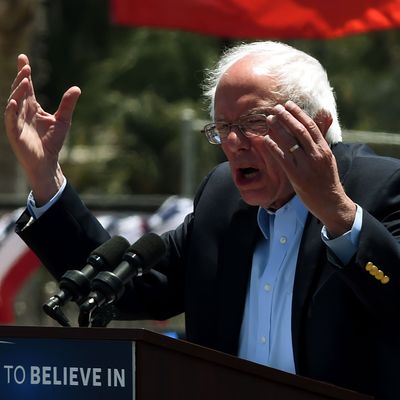
Bernie Sanders’s presidential campaign has once again escalated its ongoing feud with the DNC and attempts to wield more power at the Party’s national convention in July, this time attempting to remove former Massachusetts congressman Barney Frank and current Connecticut governor Dannel Malloy from their respective roles as co-chairs of two convention committees, according to Politico. Via a formal letter sent to the DNC on Friday, the Sanders campaign challenged the credentials of the two men on the grounds that they have both been “aggressive attack surrogates for the Clinton campaign,” and that “their criticisms of Senator Sanders have gone beyond dispassionate ideological disagreement and have exposed a deeper professional, political, and personal hostility toward the Senator and his Campaign.”
The co-chairs of the DNC’s Rules and Bylaws committee rejected the challenge on Saturday, saying they were “compelled to dismiss” the complaint after concluding it “failed to allege” any actual violations of the convention’s rules, as reported by the Hill.
At issue are comments each of the men have made about Sanders, including Representative Frank having called him “outrageously McCarthyite” in a March interview, and Governor Malloy having repeatedly criticized Sanders for the senator’s votes against gun control, and suggesting he be “held responsible” for any “death and destruction” that resulted from them. The Sanders campaign cited other examples in their letter as well, even including a comment Frank had made about Sanders back in 1991. Congressman Frank is co-chair for the convention’s Rules Committee, which, unsurprisingly, establishes rules for the convention, and Governor Malloy is a co-chair of the convention’s Platform Committee, which is responsible for setting the party’s agenda and official policies on a variety of issues.
Politico got a response from Frank regarding the challenge, who said, “It is inconceivable to me that anything could come before that committee that will affect who the nominee is,” adding that he hoped the Sanders campaign wasn’t trying to “lay the basis for an inaccurate claim that [Sanders] was unfairly denied the nomination.” In a separate interview with the Wall Street Journal, Frank also pledged on Saturday that if any issue did come up before the Rules Committee that could influence which candidate receives the nomination, he would recuse himself, and he went on to reiterate his criticism of Sanders by arguing that the senator is unlikely to be a harbinger of progressive change when, “the fact is that he has not been a very effective change agent in 25 years in Congress, and that seems to be relevant to voters in deciding who to support.”
Being an effective change agent at the convention may be a different story, however. According to the Journal, Sanders spokesperson Michael Briggs responded to the DNC’s dismissal of their complaint by insisting they would keep fighting, “This doesn’t settle anything. We will raise the same serious issues when the committees convene [at the convention].” Indeed in their original letter, the Sanders campaign said that if the DNC didn’t remove Frank and Malloy, they would present their objections again during the committee meetings, and go so far as to draft and adopt “minority reports from both standing Committees for presentation to the floor of the full convention.”
Of course none of this addresses the fact that save some nearly impossible upsets for Sanders in the remaining primaries, he will still trail Clinton in both the popular vote and pledged delegates heading into the convention, and how the makeup of the convention committees will change that math remains unclear. What is apparent, however, is while the Party and the Clinton campaign are trying to figure out how to unify the party, including this week’s concession of some control over who gets to draft the platform, the Sanders campaign seems to have something else in mind.






























